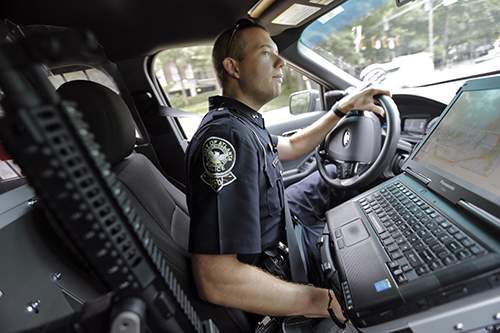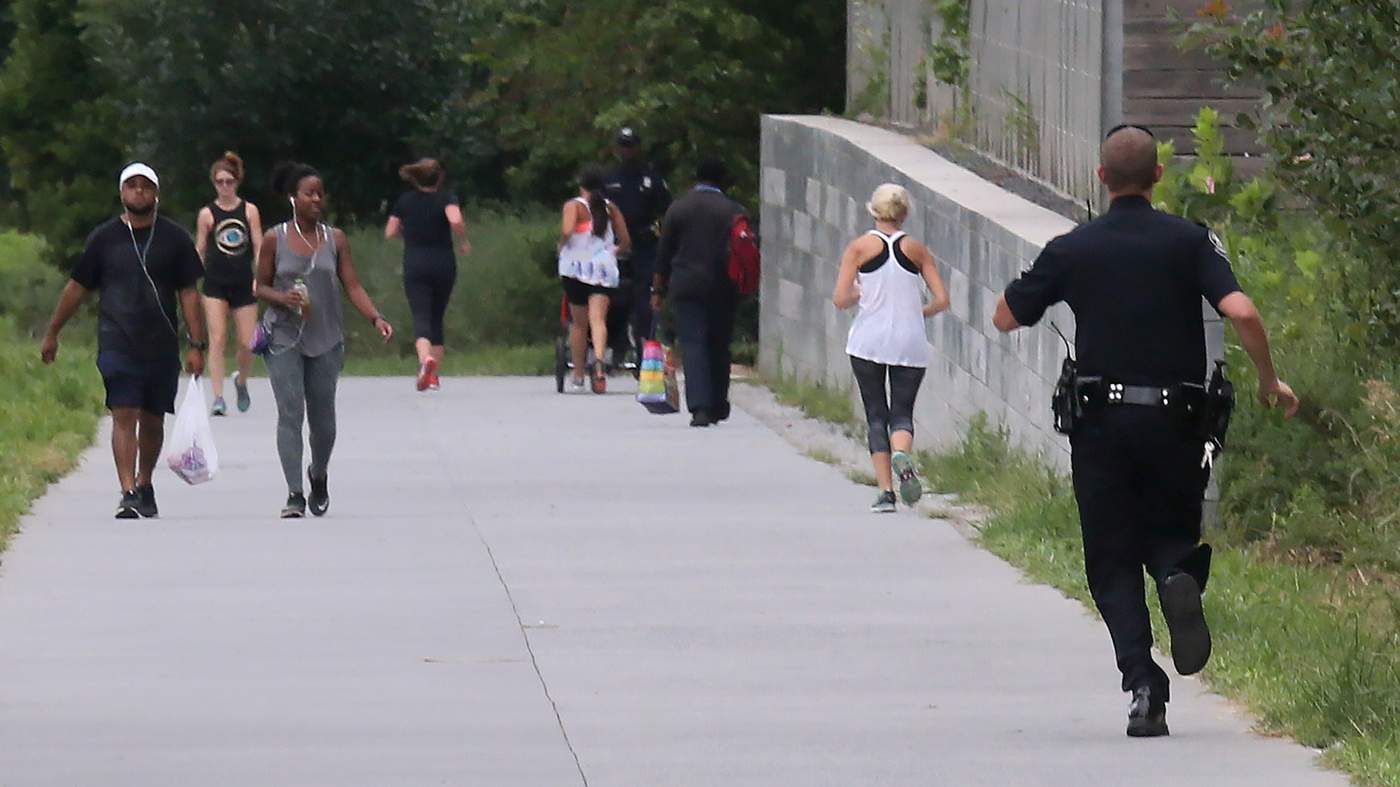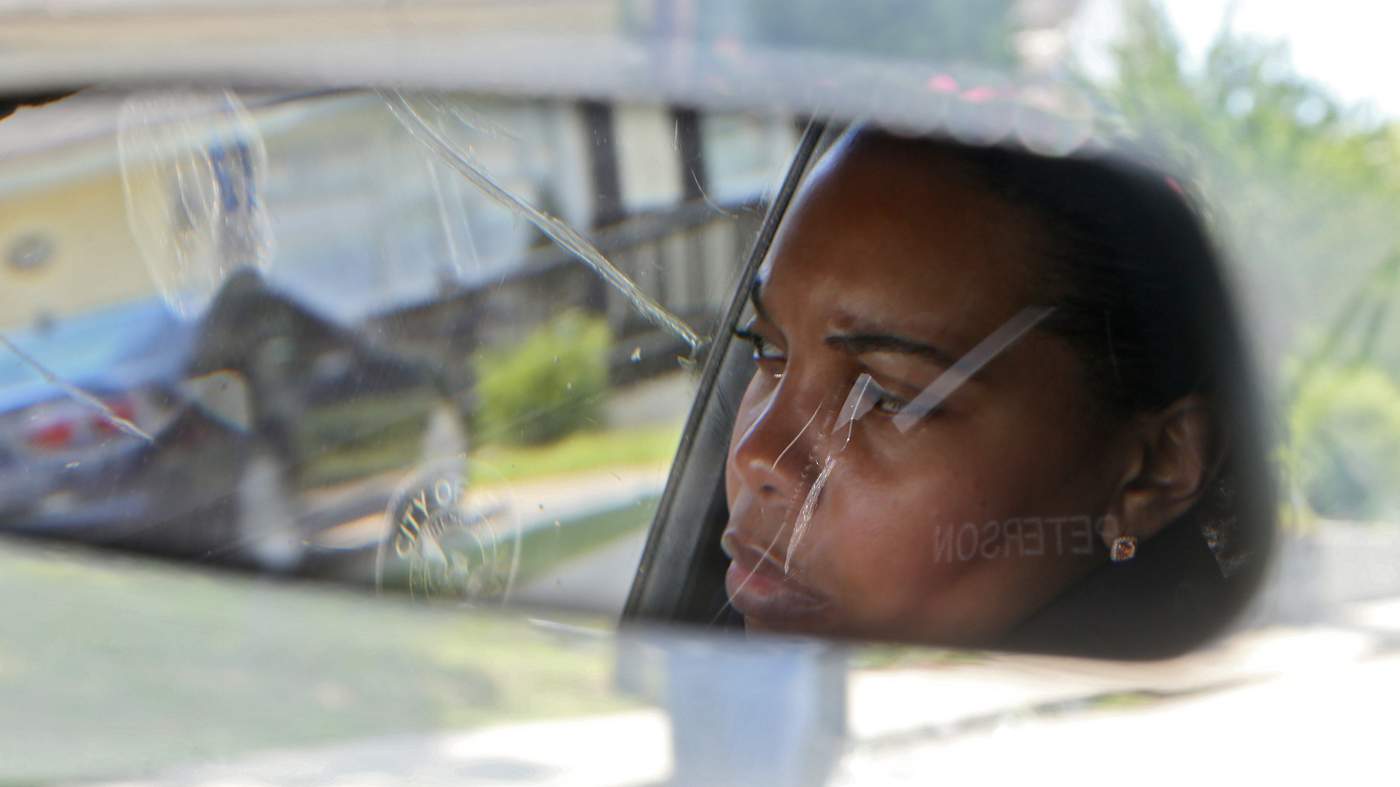‘Any day my life can be over’
Peterson gets a call about an intruder alarm at a brick home with white trim in Southwest Atlanta. She doesn’t know what she’ll find as she pulls into a tidy subdivision with well-manicured lawns and swing sets. Is it a false alarm? Is someone burglarizing the house? Is it an ambush? She has learned to keep her head on a swivel, to remain constantly on guard, to fight off complacency.
“Any day my life can be over,” she says.
No cars are in the driveway when she pulls up. She jiggles the handles of the garage doors, confirming they’re locked. She glances at the blinds in the windows, searching for movement. She peers over the fence and into the backyard. She knocks on the front door and then promptly takes a few steps backward.
“It could be a setup. You never know,” she says. “I don’t ever want to be that close up on anybody’s property because I don’t know what is behind that door.”
“This is my family now. So whether you guys like us or not, this is who I am going to stick with.”
Nobody answers. The alarm must have been a mistake.
The day she learned a heavily-armed sniper had gunned down five officers in Dallas, Peterson considered calling in sick. She wondered if the same thing could happen in Atlanta. She wondered whether she was in the right job. But she mustered her courage, put on her gun belt and headed into work that day.
She understands why the Black Lives Matter demonstrators are protesting and she sympathizes with the families of Philando Castile and Alton Sterling. But police, she says, are sometimes painted with a broad brush. When she moved from Philadelphia to Atlanta in 2012, she had no friends or family here.
“This is my family now,” she says of her fellow officers. “So whether you guys like us or not, this is who I am going to stick with.”
A chase and a prayer
A call comes over the radio about police chasing a shoplifting suspect on foot near the Ponce City Market. Cosby accelerates and then grits his teeth as his Ford Explorer briefly refuses to switch gears.
His SUV carries a lot of heavy equipment, including his rifle, a helmet and an upgraded bullet-proof vest. He was issued all of that after volunteering for a special job that requires him to immediately respond in case of any mass shootings like the Nov. 13 terrorist massacre that killed 130 people in Paris. In such a scenario, Cosby says, he would be the “first rabbit in the door.”
“Somebody has got to do it,” he says. “So why not me?”
Cosby parks his car in an alley and then sprints down the Atlanta BeltLine, running past joggers and cyclists in the shadow of the towering Ponce City Market. He is scanning for a man who stole some chips from a nearby CVS store and then struggled with an employee who tried to stop him.
A fellow officer steps in front of the suspect on the BeltLine as Cosby comes up from behind him. Caught between the two officers, the suspect appears bewildered and gives up peacefully. They check him for weapons. Then Cosby asks him: “You are not hurt or injured are you?” The man says he isn’t. And then the officers guide him into the back of a patrol car.
Cosby says his Christian faith helps him deal with the dangers of his job as well as the graphic scenes he sometimes witnesses, such as the bodies of people who have been shot or hit by cars.

Troy Cosby responds to a report of drug dealers at a laundromat. As a Tactical Field Operator, he is equipped with additional tactical equipment, including a rifle (seen here at left) and breaching equipment. (BOB ANDRES / bandres@ajc.com)
“Even with all this going on, it doesn’t scare me one bit to strap on the gun belt and come to work because God is in control,” he says. “So if it is your time, it is your time. It definitely helps having that type of belief whenever you see some of the stuff we run across.”
“I don’t know if it is just my belief,” he continues. “But if you don’t have religion whenever you start this job, somehow I got a feeling you are going to have it by the time you get out of this job.”
Peterson holds similar views and prays for safety every time she and her fiancé leave for work.

While Officer Dwan Peterson was at lunch, Dr. Darryl Clayton (right) and Rev. Dr. Sherry Austin asked to pray with her. (BOB ANDRES / bandres@ajc.com)
Toward the end of her shift she stops for lunch at a deli near the Atlanta airport. She takes her sandwich to a table near the front door and in full view of the restaurant. As she sits down to eat, a pair of strangers sitting next to her introduce themselves and ask if they could pray for her safety. The man and women explain they were shaken by the shootings in Texas and Louisiana. They briefly hold Peterson’s hand and bow their heads as the other diners look on. Peterson hugs and thanks them. Then she heads back out on patrol.
“I am proud to put this uniform on,” she says in her lingering Philly accent. “There is never a moment where I feel embarrassed or ashamed, or like I don’t want to walk the streets in this uniform. Not at all. I believe with this job and in this career I am sent here to help folks.”









Please confirm the information below before signing in.